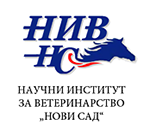Partners : NIV

Scientific Veterinary Institute “Novi Sad” (NIV)
Rumenacki put 20, 21000 Novi Sad.
Phone: +381 21 4895 300; Fax: +381 21 518 544
Web: http://niv.ns.ac.rs/ ; e-mail: niv@niv.ns.ac.rs
1. Scientific Veterinary Institute "Novi Sad" (NIV-NS) is a state research institution. NIV-NS possesses more than 40 years of experience in R&D for the needs of enterprises and in supporting agrarian regional policies. More than 50 research projects have been done during the last 20 years. Moreover, NIV-NS is the leader representative in the field of veterinary medicine in the country and develops strategic and operative developmental programs for protection of animal health, food and feed safety and quality (HACCP system), welfare of animals and protection of the environment that are in accordance to international legislation and standards.
Most important events in history of the Institute:
1950 – the Institute was established
1959 – received the status of scientific and research institution
1998 – received international certificate for introduced quality system ISO 9001:1994
1998 – accreditation of the Institute for Laboratory Examinations EN 45001
2002 – received the international certificate for introduced quality system ISO 9001:2000
2004 – accreditation of the Institute for Laboratory Examinations 17025:2001
2006 – start with participation in COST projects
2008 – starts with participation in EU FP7 projects
2010 – start with participation in IPA projects
NIV-NS constitutes from: Laboratory for Virology, Laboratory for Bacteriology, Laboratory for Serology, Laboratory for food analysis, Laboratory for feed control, and Laboratory for drug examination and toxicology, small BSL3 level facility, Facilities for Small Laboratory Animals, Containment Animal Facilities as well as Department for epidemiology, clinical examination and reproduction of different animal species and collaboration with SME – different animals breeding farms (cattle, swine, ovine and goats, fish and bees), food and feed production, processing facilities and retails. Laboratories are approved for ISO 9001 and certain techniques accredited under ISO/IEC 17025).
2. Main activities at the NIV-NS are diagnostic and research work in the field of veterinary medicine, biotechnology sciences and technologic development and multidisciplinary research in medicine, agriculture and protection of the environment as well as on the implementation of scientific results on the field. Our interdisciplinary team (in Institute) consists of 34 scientists (86 employers) with extensive expertise in different areas.
In the field of scientific and research work with ISO 9001 approved and under ISO/IEC 17025 accredited laboratory, our team work on protection of animal health, food and of feed safety and quality, prevention, detection, control and eradication of contagious diseases and zoonosis, reproduction and clinical examination of animals, control of the drugs used in veterinary medicine, vaccine laboratory and clinical trials (authorized by Medicines and Medical Devices Agency of Serbia), as well as welfare of animals and protection of the environment.
3. The key areas of research, for researcher from the NIV-NS project team, are: detection of animal and human viral diseases by classical (virus isolation, VN, ELISA, IH, AGID) and molecular tests (PCR, RT-PCR, real-time PCR), prevention, control and eradication of contagious viral diseases and zoonosis, detection of viruses in domestic and wild animals, environment (environmental virology), virus vectors including different mosquito species.
4. Research activities of NIV team will be in WP1, WP2 and WP 4
5. Research in Scientific Veterinary Institute “Novi Sad” conducted in the project proposal subject area on vector borne viruses started with Blue tongue virus detection methods establishment shortly after year 2003. From 2009, studies were mainly concentrated on West Nile virus (WNV) and Usutu virus (USUV) as mosquito-borne zoonotic arbovirus belonging to the genus Flavivirus in the family Flaviviridae, presence in Serbia. First serological study on WNV and USUV presence was conducted on horses sampled during 2009 and 2010 in Vojvodina province of Serbia (Lupulović et al., 2011). This study, jointly performed with researchers from institute INIA in Madrid, showed for the first time in Serbia that 12% of 349 horses had specific neutralizing WNV antibodies and that one of them was positive on USUV (the first serological results on USUV in horses). After this, a few more serological studies have been conducted for monitoring purposes of WNV in horse population in Serbia as indicator of possible human exposure (Petrovic et al., 2013a). From 2011 WNV isolation on tissue culture and molecular methods (like RT-PCR and real-time RT-PCR) were introduced in the lab. During that period WNV circulation was serologically examined by ELISA and PRNT as well as by real-time RT-PCR and virus isolation in 134 wild resident and migratory birds from 46 species collected from January until August 2012 in Serbia (Petrović et al., 2013b). In that study, WNV was for the first time detected and isolated in Serbia (from dead goshawk), as well as full genome sequenced and typed. WN virus detection procedures in mosquitoes have been introduced in the lab and first studies on WNV presence in mosquitoes were started in 2012 (Petrović et al., 2013a). During 2013, few hundred mosquito pools were tested and about 10% were found positive for WNV (in 2013, 304 official human WNV cases were reported). Besides mentioned, Schmallenberg virus detection methods and research was established and started in 2012 and during 2013 we introduced Phleboviruses detection and characterization procedures in virus vectors.
